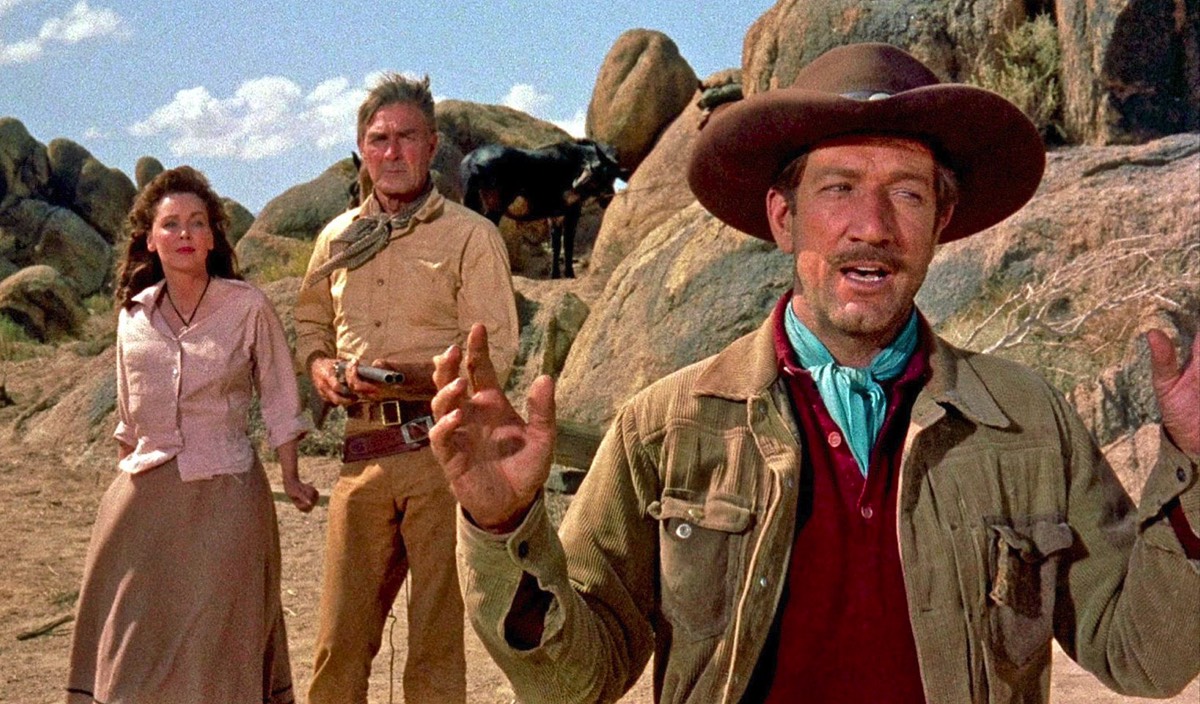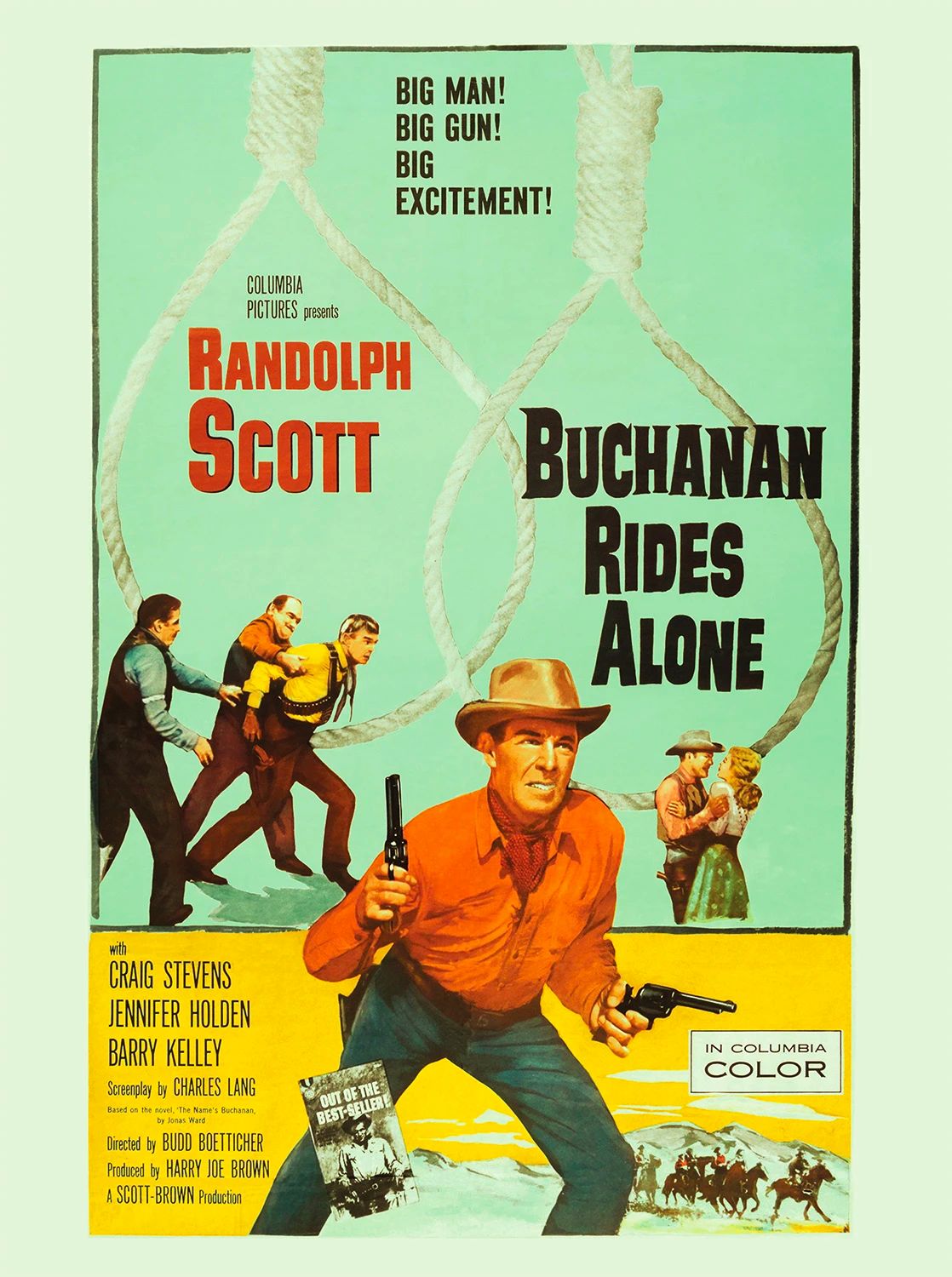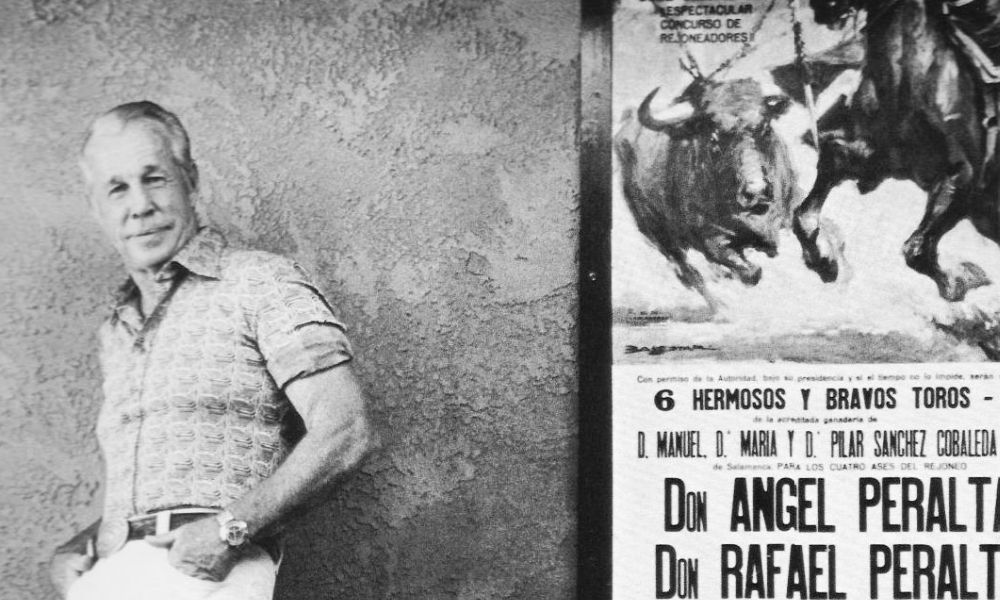“Budd Boetticher’s reputation rests on the series of modestly budgeted, tightly structured, pictorially striking Westerns he made between 1956 and 1960… At a time when ‘adult’ Westerns were flooding the screens, these films stood out by virtue of restoring the traditional concept of a clear moral order - good versus evil, honor versus disgrace.” - Ted Sennett (Great Movie Directors, 1986)
Budd Boetticher
Director / Producer / Screenwriter
(1916-2001) Born July 29, Chicago, Illinois, USA
(1916-2001) Born July 29, Chicago, Illinois, USA
Key Production Countries: USA
Key Genres: Western, Action, Traditional Western, Thriller, Crime, Drama, Psychological Western, Psychological Thriller, Mystery
Key Collaborators: Randolph Scott (Leading Actor), Lucien Ballard (Cinematographer), Burt Kennedy (Screenwriter), Heinz Roemheld (Composer), Karen Steele (Leading Actress), Harry Joe Brown (Producer), Charles Lawton Jr. (Cinematographer), Al Clark (Editor), Leslie Thomas (Production Designer), John Hubbard (Character Actor), Dyke Johnson (Character Actor), Trevor Bardette (Character Actor)
Key Genres: Western, Action, Traditional Western, Thriller, Crime, Drama, Psychological Western, Psychological Thriller, Mystery
Key Collaborators: Randolph Scott (Leading Actor), Lucien Ballard (Cinematographer), Burt Kennedy (Screenwriter), Heinz Roemheld (Composer), Karen Steele (Leading Actress), Harry Joe Brown (Producer), Charles Lawton Jr. (Cinematographer), Al Clark (Editor), Leslie Thomas (Production Designer), John Hubbard (Character Actor), Dyke Johnson (Character Actor), Trevor Bardette (Character Actor)
"Clearly the Westerns of the sixties and seventies owe more to Boetticher than Ford. Even such very minor works as Horizons West, The Wings of the Hawk, and The Man from the Alamo have the tensions of Spaghetti Westerns (without the iciness), as well as the Peckinpah fantasy of American expertise combining with Mexican peasant vitality. If Peckinpah and Leone are the masters of the post‘‘classic’’ Western, then it’s worth noting how The Wings of the Hawk anticipates The Wild Bunch, and how Once upon a Time in the West opens like Seven Men from Now and closes like Ride Lonesome. Boetticher’s films are the final great achievement of the traditional Western, before the explosion of the genre." - Scott Simmon (International Dictionary of Films and Filmmakers, 2000)
“Made three bullfighting movies, two of which, The Bull-Fighter and the Lady (1951) and The Magnificent Matador (1955) had more bull outside the ring than inside. More is said about dignity and courage in the series of seven B Westerns (all around 70 mins.) starring Randolph Scott. Made in twelve to eighteen days, they were as taut and laconic as their hero, had a classic plot told with an unselfconscious narrative force that makes them models of the genre.” - Ronald Bergan (A-Z of Movie Directors, 1983)

The Tall T (1957)
“A director whose life and work were strikingly intertwined, Boetticher, was an apprentice matador in Madrid in 1941 when he was hired as a technical consultant for Rouben Mamoulian’s Blood and Sand, starring Tyrone Power. Seduced by the filmmaking business, Boetticher left the bullring, but the bullring never left Boetticher. The torero’s way of life continued to influence the rest of his career both directly and indirectly… From 1956 to 1960, Boetticher made his mark as a director of distinction in a series of westerns starring Randolph Scott. The films, known as the “Ranown cycle” (because the movies were produced by the team of Randolph Scott and his partner Harry Joe Brown), were a distillation of the fundamental elements of the western: honor, pride, and machismo, with a marvelous simplicity that suggests both the style and themes of the work of Ernest Hemingway.” - The Encyclopedia of Hollywood, 2004
"His wasn’t the west of John Ford, with its romanticised view of history, or that cruelly psychologised by Anthony Mann. The Boetticher west was one of terseness and spareness, stripped back stages on which a moral battle between equals would be fought." - Matthew Thrift (BFI, 2019)
“Budd Boetticher provides one of the test cases, and one of the unresolvable problems, for auteur theory. The body of distinguished work that claims attention and recognition is composed almost entirely of the series of Westerns produced by Harry Joe Brown, scripted by Burt Kennedy, starring Randolph Scott: the ‘Ranown’ cycle. Outside these films, there is not a great deal in Boetticher’s work that demands consideration… It is fair to say that without the Ranown pictures Boetticher would scarcely justify a footnote.” - Robin Wood (Cinema: A Critical Dictionary, 1980)
"“The career of Boetticher is one of the most interesting ever confined to B pictures… Two films at least—The Tall T and Ride Lonesome—must be in contention for the most impressive and least handicapped B films ever made. Above all, Boetticher had stressed the character and mythic value in visual narrative, and he has a more secure place in the history of the Western than several more self-conscious narrators of its breakdown. In 1960, Boetticher added a fine gangster film to his oeuvre, The Rise and Fall of Legs Diamond, which only proved the range of his talent.” - David Thomson (The New Biographical Dictionary of Film, 2010)
“Boetticher told his stark, ritualistic stories with laconic dialogue and a minimum of visual fuss, refusing to romanticise his antagonists and using the rocky, parched landscape to lend a mythic, timeless dimension to their conflict.” - Geoff Andrew (The Director's Vision, 1999)
Selected Filmography
{{row.titlelong}}
GF Greatest Films ranking (★ Top 1000 ● Top 2500)
T TSPDT N 1,000 Noir Films
R Jonathan Rosenbaum S Martin Scorsese
T TSPDT N 1,000 Noir Films
R Jonathan Rosenbaum S Martin Scorsese
Budd Boetticher / Favourite Films
Bullfighter and the Lady (1951) Budd Boetticher, Casablanca (1942) Michael Curtiz, For Whom the Bell Tolls (1943) Sam Wood, Lawrence of Arabia (1962) David Lean, Seven Men from Now (1956) Budd Boetticher, The Sting (1973) George Roy Hill, The Treasure of the Sierra Madre (1948) John Huston, The Way We Were (1973) Sydney Pollack.
Source: Time Out (1995)
Bullfighter and the Lady (1951) Budd Boetticher, Casablanca (1942) Michael Curtiz, For Whom the Bell Tolls (1943) Sam Wood, Lawrence of Arabia (1962) David Lean, Seven Men from Now (1956) Budd Boetticher, The Sting (1973) George Roy Hill, The Treasure of the Sierra Madre (1948) John Huston, The Way We Were (1973) Sydney Pollack.
Source: Time Out (1995)
Budd Boetticher / Fan Club
Bertrand Tavernier, Jeffrey M. Anderson, Budd Boetticher, Edward Buscombe, Christopher Petit, Adrian Martin, Richard Brody, Andrew Sarris, Paul Schrader, Andrew Schenker, Leonard Maltin, Philip French.
Bertrand Tavernier, Jeffrey M. Anderson, Budd Boetticher, Edward Buscombe, Christopher Petit, Adrian Martin, Richard Brody, Andrew Sarris, Paul Schrader, Andrew Schenker, Leonard Maltin, Philip French.
"Fan Club"
These film critics/filmmakers have, on multiple occasions, selected this director’s work within film ballots/lists that they have submitted.
These film critics/filmmakers have, on multiple occasions, selected this director’s work within film ballots/lists that they have submitted.


